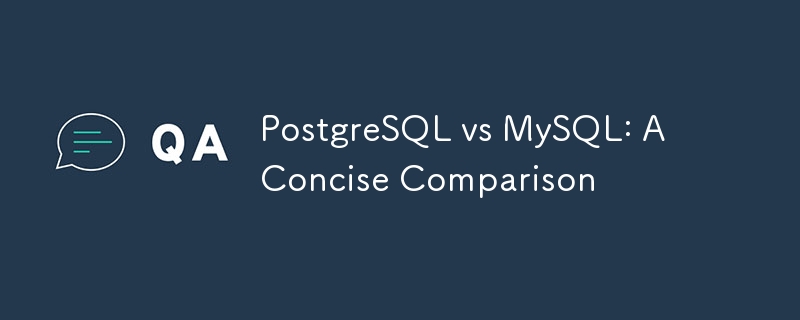

PostgreSQL and MySQL dominate the relational database market. This article provides a concise overview of their similarities and differences to help you decide which to use.
PostgreSQL and MySQL share several important characteristics. Both are open-source, allowing public access and modification of their source code. They adhere to the relational database model, organizing data in tables with rows and columns, and supporting primary and foreign key constraints.
Each uses SQL for data interaction and management. Both databases ensure data consistency through constraints and various mechanisms and provide built-in features for replication, backup, and access control to ensure high availability.
They offer robust user management with role-based access control and multiple account support, as well as indexing features to enhance query performance.
Although PostgreSQL and MySQL have many similarities, they also exhibit distinct differences.
PostgreSQL supports a broader range of advanced data types such as JSONB and XML, whereas MySQL focuses on standard SQL types. MySQL uses the AUTO_INCREMENT attribute for auto-increment functionality, while PostgreSQL uses sequences.
PostgreSQL always supports Multiversion Concurrency Control (MVCC) for simultaneous read and write operations, while MySQL implements MVCC only with the InnoDB storage engine. PostgreSQL offers a wider variety of index types compared to MySQL. PostgreSQL's full-text search capabilities are more advanced than those of MySQL.
Additionally, PostgreSQL supports transactional Data Definition Language (DDL) operations, which allows schema changes to be rolled back within a transaction block.
PostgreSQL is fully ACID compliant, whereas MySQL's compliance is partial. Only PostgreSQL supports materialized views. PostgreSQL also allows stored procedures to be written in multiple languages, including PL/pgSQL, PL/Tcl, PL/Perl, and PL/Python, while MySQL supports only SQL.
Finally, PostgreSQL provides more types of triggers, including AFTER, BEFORE, and INSTEAD OF triggers, whereas MySQL supports only AFTER and BEFORE triggers.
Do they support JSON?
Yes, but PostgreSQL offers more advanced functionality.
Which is more popular?
MySQL has a larger market share.
Which is faster?
PostgreSQL excels in write-intensive scenarios; MySQL in read-intensive ones.
Which companies use PostgreSQL?
Apple, Sony, and Reddit use PostgreSQL. Facebook, Twitter, and Uber use MySQL.
This comparison outlines the primary features of PostgreSQL and MySQL. For an in-depth analysis, read the article PostgreSQL vs MySQL: The Definitive Comparison.
The above is the detailed content of PostgreSQL vs MySQL: A Concise Comparison. For more information, please follow other related articles on the PHP Chinese website!




